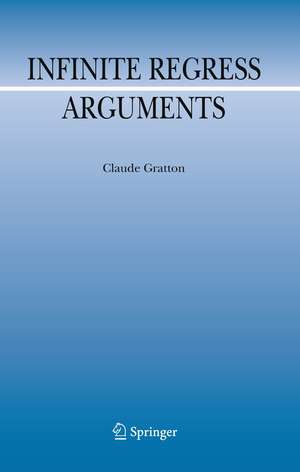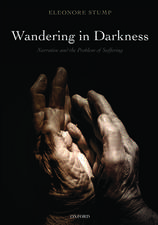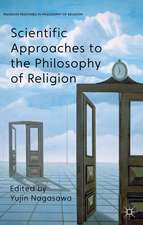Infinite Regress Arguments: Argumentation Library, cartea 17
Autor Claude Grattonen Limba Engleză Paperback – 4 mai 2012
My general approach to contribute to such a theory, consists of collecting and evaluating as many infinite regress arguments as possible, comparing and contrasting many of the formal and non-formal properties, looking for recurring patterns, and identifying the properties that appeared essential to those patterns. Two very general questions guided this work: (1) How are infinite regressesgenerated in infinite regress arguments? (2) How do infinite regresses logically function as premises in an argument? In answering these questions I clarify the notion of an infinite regress; identify different logical forms of infinite regresses; describe different kinds of infinite regress arguments; distinguish the rhetoric from the logic in infinite regress arguments; and suggest ways of improving our discussion and our practice of constructing and evaluating these arguments.
| Toate formatele și edițiile | Preț | Express |
|---|---|---|
| Paperback (1) | 636.80 lei 6-8 săpt. | |
| SPRINGER NETHERLANDS – 4 mai 2012 | 636.80 lei 6-8 săpt. | |
| Hardback (1) | 643.00 lei 6-8 săpt. | |
| SPRINGER NETHERLANDS – 4 feb 2010 | 643.00 lei 6-8 săpt. |
Din seria Argumentation Library
- 18%
 Preț: 894.03 lei
Preț: 894.03 lei - 18%
 Preț: 1393.40 lei
Preț: 1393.40 lei - 15%
 Preț: 644.63 lei
Preț: 644.63 lei - 15%
 Preț: 644.30 lei
Preț: 644.30 lei - 15%
 Preț: 640.06 lei
Preț: 640.06 lei - 18%
 Preț: 1224.36 lei
Preț: 1224.36 lei - 15%
 Preț: 641.03 lei
Preț: 641.03 lei - 15%
 Preț: 637.78 lei
Preț: 637.78 lei - 15%
 Preț: 637.28 lei
Preț: 637.28 lei - 15%
 Preț: 636.30 lei
Preț: 636.30 lei - 15%
 Preț: 643.99 lei
Preț: 643.99 lei - 15%
 Preț: 637.13 lei
Preț: 637.13 lei - 18%
 Preț: 948.47 lei
Preț: 948.47 lei - 15%
 Preț: 643.34 lei
Preț: 643.34 lei -
 Preț: 390.63 lei
Preț: 390.63 lei -
 Preț: 494.70 lei
Preț: 494.70 lei - 20%
 Preț: 572.40 lei
Preț: 572.40 lei -
 Preț: 391.02 lei
Preț: 391.02 lei - 15%
 Preț: 678.35 lei
Preț: 678.35 lei - 15%
 Preț: 647.27 lei
Preț: 647.27 lei - 24%
 Preț: 710.70 lei
Preț: 710.70 lei - 15%
 Preț: 637.46 lei
Preț: 637.46 lei - 24%
 Preț: 829.94 lei
Preț: 829.94 lei - 15%
 Preț: 644.30 lei
Preț: 644.30 lei - 15%
 Preț: 703.20 lei
Preț: 703.20 lei - 19%
 Preț: 426.51 lei
Preț: 426.51 lei - 18%
 Preț: 735.53 lei
Preț: 735.53 lei
Preț: 636.80 lei
Preț vechi: 749.19 lei
-15% Nou
Puncte Express: 955
Preț estimativ în valută:
121.88€ • 126.76$ • 102.14£
121.88€ • 126.76$ • 102.14£
Carte tipărită la comandă
Livrare economică 14-28 martie
Preluare comenzi: 021 569.72.76
Specificații
ISBN-13: 9789400731516
ISBN-10: 9400731515
Pagini: 224
Ilustrații: XII, 211 p.
Dimensiuni: 155 x 235 x 12 mm
Greutate: 0.32 kg
Ediția:2009
Editura: SPRINGER NETHERLANDS
Colecția Springer
Seria Argumentation Library
Locul publicării:Dordrecht, Netherlands
ISBN-10: 9400731515
Pagini: 224
Ilustrații: XII, 211 p.
Dimensiuni: 155 x 235 x 12 mm
Greutate: 0.32 kg
Ediția:2009
Editura: SPRINGER NETHERLANDS
Colecția Springer
Seria Argumentation Library
Locul publicării:Dordrecht, Netherlands
Public țintă
ResearchCuprins
What is an Infinite Regress Argument?.- The Formal and Nonformal Logic of Infinite Concatenating Regresses.- Viciousness.- Circular Definitions, Circular Explanations, and Infinite Regresses.- Infinite Regresses and Recurring Questions.- Infinite Regresses of Recurring Problems and Responses.
Recenzii
From the reviews:
“This is a much welcomed book. Its main message is: make your infinite regress argument explicit! The typical presentation of such an argument is, as Gratton puts it, ‘so succinct and has so many gaps’ … that we hardly know what to think of it. … The book is a very welcome addition to the philosophical toolkit.” (Jan Willem Wieland, Argumentation, Vol. 25, 2011)
“This is a much welcomed book. Its main message is: make your infinite regress argument explicit! The typical presentation of such an argument is, as Gratton puts it, ‘so succinct and has so many gaps’ … that we hardly know what to think of it. … The book is a very welcome addition to the philosophical toolkit.” (Jan Willem Wieland, Argumentation, Vol. 25, 2011)
Textul de pe ultima copertă
Infinite regress arguments are part of a philosopher's tool kit of argumentation. But how sharp or strong is this tool? How effectively is it used? The typical presentation of infinite regress arguments throughout history is so succinct and has so many gaps that it is often unclear how an infinite regress is derived, and why an infinite regress is logically problematic, and as a result, it is often difficult to evaluate infinite regress arguments. These consequences of our customary way of using this tool indicate that there is a need for a theory to re-orient our practice.
My general approach to contribute to such a theory, consists of collecting and evaluating as many infinite regress arguments as possible, comparing and contrasting many of the formal and non-formal properties, looking for recurring patterns, and identifying the properties that appeared essential to those patterns. Two very general questions guided this work: (1) How are infinite regresses generated in infinite regress arguments? (2) How do infinite regresses logically function as premises in an argument? In answering these questions I clarify the notion of an infinite regress; identify different logical forms of infinite regresses; describe different kinds of infinite regress arguments; distinguish the rhetoric from the logic in infinite regress arguments; and suggest ways of improving our discussion and our practice of constructing and evaluating these arguments.
My general approach to contribute to such a theory, consists of collecting and evaluating as many infinite regress arguments as possible, comparing and contrasting many of the formal and non-formal properties, looking for recurring patterns, and identifying the properties that appeared essential to those patterns. Two very general questions guided this work: (1) How are infinite regresses generated in infinite regress arguments? (2) How do infinite regresses logically function as premises in an argument? In answering these questions I clarify the notion of an infinite regress; identify different logical forms of infinite regresses; describe different kinds of infinite regress arguments; distinguish the rhetoric from the logic in infinite regress arguments; and suggest ways of improving our discussion and our practice of constructing and evaluating these arguments.
Caracteristici
The first book publication to contribute to a theory of infinite regress arguments Uncovers different kinds of infinite regresses used as premises Identifies different kinds of infinite regress arguments Suggests ways of improving our construction or evaluation of infinite regress arguments
















